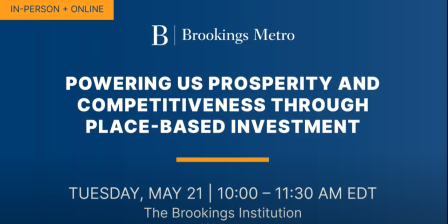Archived Content
This site contains information that has been considered archived and will no longer be updated.
Celebrating the Impact of Place-Based Investing with EDA & Brookings Metro
After decades of increasing economic divergence among regions of the United States, a slew of new federal programs included in the American Rescue Plan Act, the Infrastructure Investment and Jobs Act, the CHIPS and Science Act, and the Inflation Reduction Act aim to ensure that investments in the American economy provide benefits to places in all parts of the country.
The Economic Development Administration (EDA) is paving the way among federal agencies in these efforts through initiatives like the Build Back Better Regional Challenge (BBBRC), the Recompete Pilot Program, and the Regional Technology and Innovation Hubs (Tech Hubs) Program. These place-based grant competitions not only empower communities to build their own visions of economic growth and reinvigoration; they also level the playing field through two-phased application structures that allow regions with fewer assets or less experience with interorganizational collaboration the ability to refine these visions.
For the BBBRC, this has led to a portfolio of investments across a diverse range of geographies, populations, and industries. These 21 regional coalitions each received between $25 million and $65 million to realize their transformative visions of economic development. Ranging from advanced robotics manufacturing in Pittsburgh to kelp and oyster mariculture in Southeast Alaska, the BBBRC grantees in just 18 months since the official announcement of their awards have made substantial progress. In total, grantees have reported over $600 million in additional public funding in their economic clusters, over $2 billion in private investments, more than 4,000 individuals benefiting from employment training, and over 6,000 businesses engaged in either supply chain development or technical assistance programs. More detailed data reveal that these investments are reaching Americans of color, women, and rural populations in significant numbers, further confirming that inclusive collaboration can truly lead to widely shared prosperity.
These successes are a testament to why place-based investments in regional economies must allow for ambitious visions of economic revitalization. By offering a maximum award of $100 million, the EDA through the BBBRC invited communities to think bigger. They also represent the importance of strong collaboration and governance across economic clusters. The capacity needed to successfully deliver on these large grants has required dedicated personnel and significant time, and these lessons in program execution are helping inform the structures of both the Recompete Pilot Program and the Tech Hubs Program.
In order for these victories to be replicated beyond the geographic boundaries of the initial portfolio of 21 BBBRC grantees, communities must be able to rely on the federal government for support. Be it through an increase in direct funding opportunities, investments in civic capacity, or technical assistance, the help provided through BBBRC by the EDA to communities across the country over the past several years has proven that real change is possible when local leaders are empowered to act. As new place-based programs come online and mature both at the EDA and across the federal government, it will be increasingly vital to local economic development efforts that these models continue to be studied and refined to provide the greatest benefit possible to the American people.

